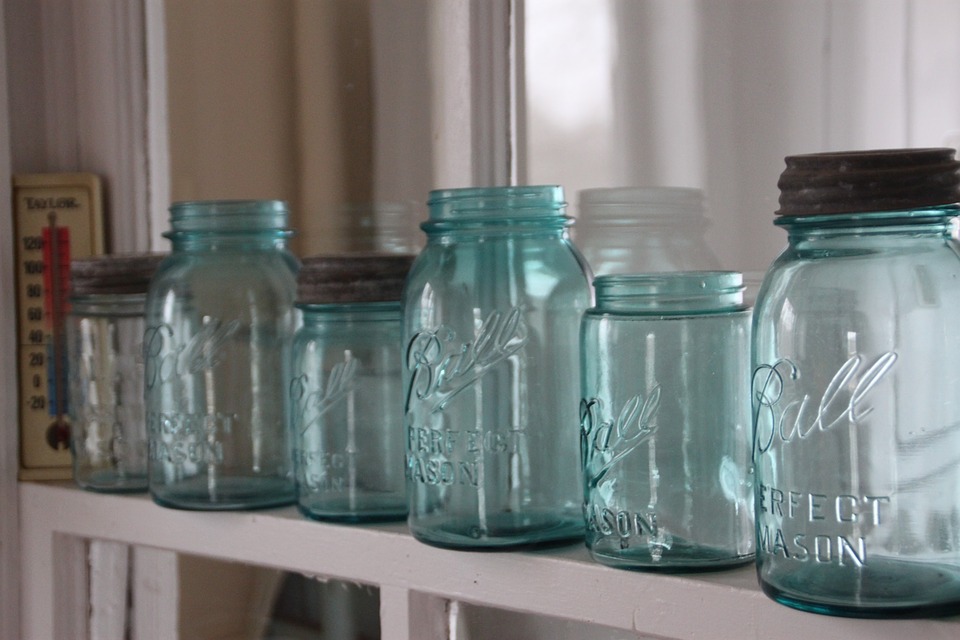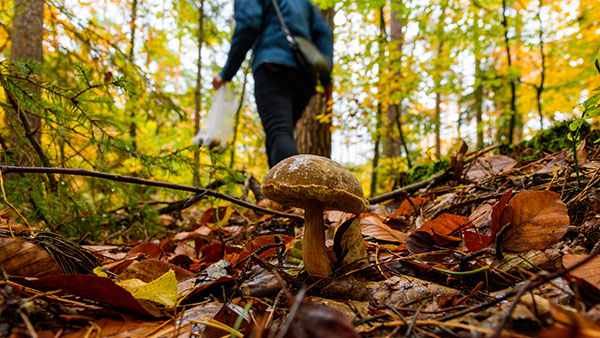
Here are some suggestions:
Canning/Mason jars
Glass canning bottles usually come with airtight and watertight screw lids and are a great way to preserve high-acid foods (fruit, pickles, salsas) and low-acid foods (meats and such) for up to a year. They're natural, robust, 100 percent recyclable glass, non-permeable (they create a true oxygen and moisture barrier), completely tasteless and reusable.
You can repurpose a variety of glass bottles, particularly peanut butter jars, because they are sturdy. Avoid using bottles or jars that have never held non-edible substances, do not have a lid with an airtight seal, have narrow necks that prevent thorough cleaning and sterilization or have been chipped or cracked.
Mason jars are specifically for the purpose of preserving or canning both wet and dry ingredients for long-term storage. They have a two-part lid system that includes a flat lid with a rubber seal on the bottom. Separate ring screws down over the top of the bottle to create an airtight, moisture-tight steal.
For wet pack canning, the lids of Mason jars should only be used once. You can purchase plastic lids to replace the metal lids for dry product storage.
Store clear glass containers with good lids in cardboard boxes or in a cool, dark storage room to reduce exposure to light to reduce food deterioration.
Mylar bags
Mylar bags (scientifically named biaxially oriented polyethylene terephthalate or BoPET), developed in the 1950s, are preferred by businesses and preppers because they are durable and puncture-resistant, flexible, gas-permeable (stashing air transfer to almost zero), light reflective and non-porous.
High-quality mylar bags have a middle layer of aluminum and different food-grade plastic layers on the inside and outside designed for long-term storage of brown rice, chips, fresh foods, granola, jerky, nuts and seeds, pearl barley and whole-wheat flour
On average, you can get around three years out of a mylar bag. Dehydrated fruits and veggies contain a lot of moisture, so they have a shorter shelf life, but it's still a few years than months. Nuts and seeds can store for around two years due to the natural oil they produce.
Mylar bags can be closed with the heat-sealing function of a vacuum sealer, a straight iron or even a clothes iron. Mylar bags are not easy to stack so condensing storage takes a second step like a separate container (e.g., five-gallon buckets) to hold your bags. Despite this minor downside, this method is cost-efficient, simple and easy to do in bulk.
Five-gallon buckets
Purchase five-gallon buckets that are specifically designated as "food safe." Use oxygen absorbers with your buckets to keep food from being oxidized or spoiling due to the presence of oxygen. This storage method also stops the growth of bugs, pupae and bug eggs in most grains.
Do not store any food that is higher than 10 percent moisture, oxygen-free because bacteria may grow in a low oxygen, high humidity environment and this will lead to botulism – a rare but serious illness caused by a toxin that attacks the body's nerves and causes difficulty breathing, muscle paralysis and even death. In addition, avoid storing high-fat foods because they can go rancid.
Store your five-gallon buckets on shelving units or on woody plants so they are off the floor at least two inches off the ground. Buckets making direct contact with a concrete floor may transfer chemicals in the concrete that can break down plastic. Ideal storage temperatures for your buckets are 75 degrees Fahrenheit or less because heat will deteriorate your emergency food stash.
Vacuum-sealed bags
Vacuum-sealed bags are great for storing small quantities of food in your freezer and can handle dehydrated goods that do not have sharp or pointed edges that can eventually puncture the plastic.
It is best to wrap dried food in parchment paper before putting it into the vacuum-sealed bag for sealing to help protect the bag from punctures. Moreover, be mindful that many hydrated foods are easy to crumble and vacuum sealing and storing can crush and break them down into smaller pieces.
Even though vacuum sealing is very helpful in saving space and in increasing food shelf life, it has its own set of disadvantages.
All the bags used for vacuum sealing are not reusable or recyclable. They are not able to seal delicate foods such as spongy and soft foods, like soft bread, cakes and crispy meringue because vacuum sealing crushes or compresses these pastries, which would change the texture of these products.
Plastics are now known to be silently involved in poisoning food – the plastic gradually mingles with the food and incorporates it with toxicity. Be cautious of the chemical substance bisphenol A, which is primarily found in plastic vacuum-sealing bags. (Related: Long-term food storage made easy.)
Visit Preparedness.com for more prepping tips.
Watch this video to learn about food preservation techniques for long-term storage and nutrition.
This video is from the Health Ranger Report channel on Brighteon.com.
More related stories:
Food storage tips and tricks for preppers.
How to easily repackage your survival food for long-term storage.
Make your food last longer safely with these food storage tips.
Sources include:
Please contact us for more information.























